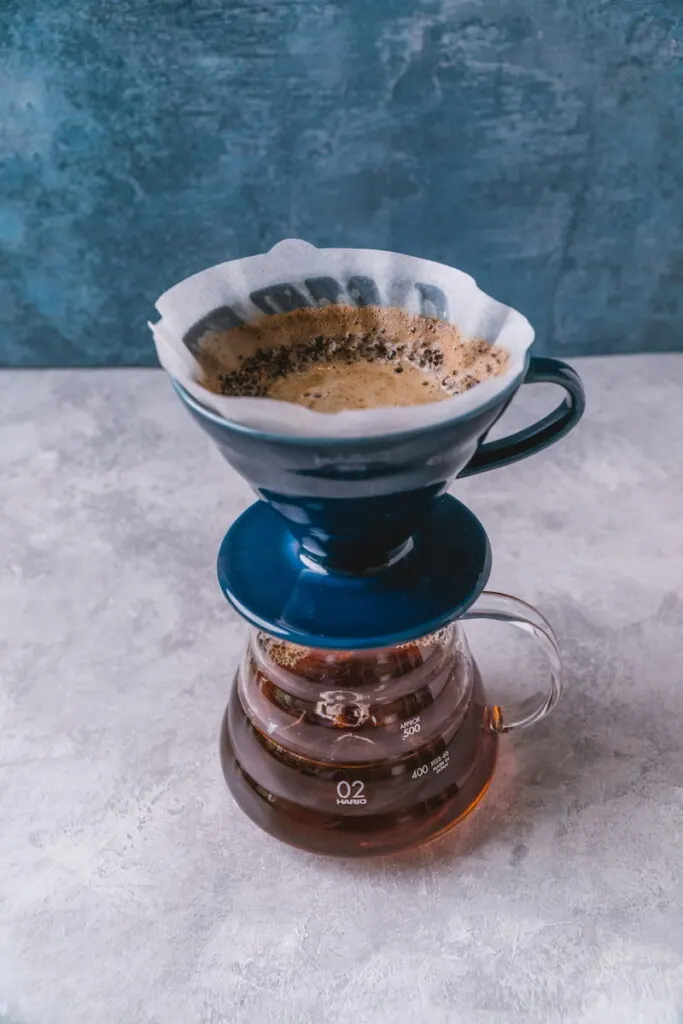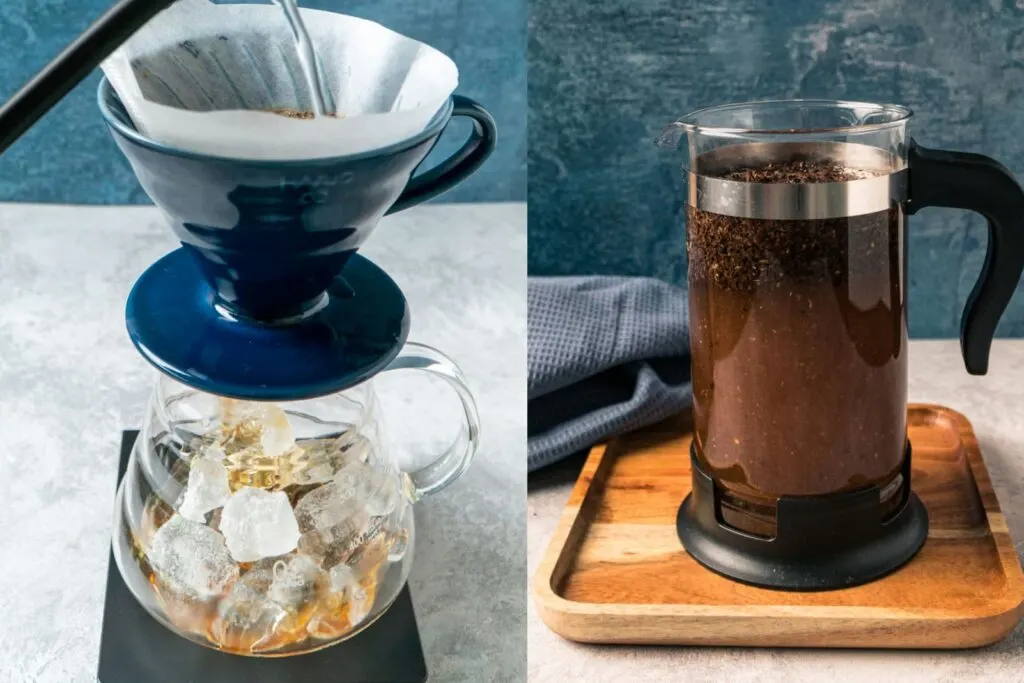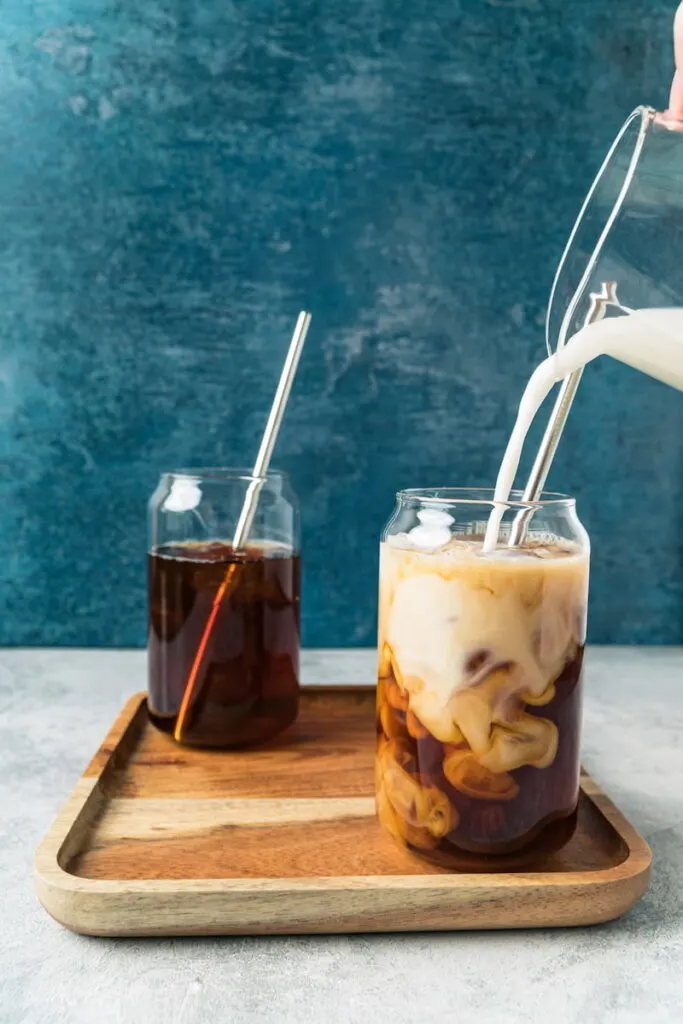Japanese iced coffee and cold brew coffee are two great options for those who like to drink their coffee ice-cold. Both taste great, but how do you choose between them? What’s the difference between a Japanese iced coffee and a cold brew coffee?
Although both are served cold, Japanese iced coffee and cold brew coffee are anything but alike. Their brewing style, time, versatility, and flavor are dramatically different. And to make Japanese iced coffee, you brew the coffee using hot water. On the other hand, Cold brew doesn’t use any hot water anywhere in its process.
These iced coffee drinks are both fantastically refreshing on any given day. But don’t mistake one for the other. And if you want to make one or both at home, let’s dive deeper into what makes Japanese iced coffee different from cold brew coffee.
Disclaimer: Hi! this post may contain affiliate links which will take you to online retailers that sell products and services. If you click on one and buy something, I may earn a commission, see my Affiliate Disclosure for more details.
Japanese Iced Coffee vs. Cold Brew Coffee
Before, the debate was ‘traditional’ iced coffee vs. cold brew coffee. But with the rise in popularity of newer iced coffee trends, the hot topic is between Japanese iced coffee and cold brew coffee.
What Is Cold Brew Coffee?

Iced coffee and cold brew are terms many people still use interchangeably. But cold brew coffee is different from the old-school way of making iced coffee – brewed, cooled, and served over ice.
While traditional iced coffee is brewed hot but served cold, cold brew coffee is brewed cold and served cold.
Its sweeter taste and little to no bitter components led to the cold brew popularity explosion in the coffee world several years back. The classic way to make a cold brew coffee is to make a concentrate by steeping medium to coarse ground coffee in cold or ambient temperature water. You can then dilute it with cold water or milk for the finished cold brew coffee drink.
What Is Japanese Iced Coffee?

If you’re an avid coffee drinker, you’ve probably come across this type of coffee multiple times. And if you haven’t heard all about Japanese iced coffee, you’re missing out. But what exactly is this iced coffee drink?
Japanese iced coffee is a brew method that gained prominence in Japan, hence, the name. If you’re wondering if it’s hot or cold coffee – the answer is both!
This type of coffee is often called ‘flash brew’ or ‘flash chilled coffee’ because of its brewing process – flash cooling hot brew coffee with ice. So technically, the final coffee you’re going to drink will not actually have ice in it. The ice cubes are used to cool down the coffee brewed in hot water rapidly.
Japanese iced coffee became a trend for coffeeholic during summers. Although die-hard iced coffee drinkers prefer ice-cold beverages any time of the year! But the Japanese iced coffee does a fantastic job of offering a glass of light and refreshing beverage that still packs the caffeine hit that coffee drinkers are looking for.
Differences Between Cold Brew Coffee and Japanese Iced Coffee
Ever been confused about the difference between Japanese iced coffee and cold brew coffee? That’s understandable because iced coffee is a broad term.
But if you want to make an incredible iced coffee that suits your taste buds and your lifestyle, learning the difference between these two iced coffees might change your life. You can make both at home, and both recipes call for freshly ground, good-quality coffee beans. No exceptions! But that’s about the things they have in common.
Japanese iced coffee and cold brew coffee are brewed differently, served differently, and dramatically tastes differently, too!
Brewing Style

These two chilled coffee drinks are made via different brewing styles. And it’s mostly in the water temperature used during extraction. The gist of it is:
- Japanese iced coffee is brewed hot directly over ice.
- Cold brew coffee uses a cold-water brewing method.
Making Japanese iced coffee involves brewing hot coffee using a pour-over cone (traditionally) directly over ice. The ice cubes will force the hot coffee to chill immediately. The entire brewing process only takes around five minutes or even less.
Meanwhile, cold brew coffee uses cold or room temperature water, creating an entirely different brewing style. Cold brewing is a slow-steeping process that can take between eight to 24 hours. You get a strong cold brew concentrate that you can drink with water and ice. And you can keep it inside your fridge for the next two weeks.
Flavor Experience

Because they use entirely different brewing methods, the difference between a cup of Japanese iced coffee and a cup of cold brew coffee can be pretty distinctive.
The delicate flavors you can get from Japanese iced coffee distinguish itself from cold brew coffee mainly because it’s brewed hot. Hot water does a fine job of extracting different layers of the coffee beans like the acid and bitter compounds. It means Japanese iced coffee taste bright and crisp with a more refreshing finish.
Japanese iced coffee might be a cold drink, but it has all the good stuff you can get from a hot coffee, like full coffee flavor in every sip.
Meanwhile, the colder water temperature used in making cold brew coffee doesn’t extract the same things that hot water does. Cold brewing doesn’t extract as much caffeine and acids as hot brewing can. So usually, a cold brew coffee will have around 50-67% fewer acids and caffeine. Hence, the difference in their tastes.
Cold brew coffee has a lack of acidity and bitterness, so the taste is smoother and calmer.
Hot brewing allows you to taste and savor the essence of the coffee beans you are using Japanese iced coffee. Meanwhile, cold brewing is a more forgiving brewing process. Even if you’re using older coffee beans, it won’t matter much. In fact, brewing older, surplus coffee beans are what cold brew coffee was built on.
The Versatility Factor

We’ve established that iced coffees can be different in many ways. And between Japanese iced coffee and cold brew coffee, one is more versatile than the other. One of them can be so much more than an iced coffee drink.
Japanese iced coffee is arguably the more flavorful one. But there aren’t many ways to modify a Japanese iced coffee drink. The only way to make new drink experiences with Japanese iced coffee is by brewing different coffee beans to explore the varying flavors they offer.
On the other hand, cold brew coffee can be anything you want to make it to. Drink it with cold water and ice to make a classic iced coffee drink. But nothing is stopping you from mixing it with different coffee add-ons, from almond milk to different coffee syrups.
You can get crazy with your cold brew. Make an iced cold brew latte, or get creative with boozy iced coffee drinks. There are hundreds of cold brew coffee recipes you can make.
Which One Is Better, Japanese Iced Coffee or Cold Brew Coffee?
Iced coffee is iced coffee, right? So, essentially, there is nothing to hate in either Japanese iced coffee or cold brew coffee. But:
If you want a spontaneous way of enjoying a cup of iced coffee, Japanese iced coffee is the quickest way to do it. If you can’t be bothered to prepare a cold brew, make Japanese iced coffee instead.
If you want to make a big batch of iced coffee for the entire week or for everyone, cold brew coffee is your solution.
If you prefer your iced coffee to be bold-flavored, Japanese iced coffee would be more to your tastes.
If you want a lighter iced coffee drink, preferably flavored with milk or syrup, cold brew coffee is the better choice for you.
Both cold brew coffee and Japanese iced coffee can taste fantastic, although that doesn’t mean you’ll like both. Deciding which one is more superior depends entirely on your taste preferences. But when it all comes down to it, you don’t have to choose between the two.
I suggest trying to make both and see which one you like best. But surely, different moments call for different types of iced coffees!
